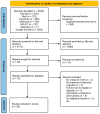The Relationship between Subjective Aging and Cognition in Elderly People: A Systematic Review
- PMID: 38132005
- PMCID: PMC10743019
- DOI: 10.3390/healthcare11243115
The Relationship between Subjective Aging and Cognition in Elderly People: A Systematic Review
Abstract
There is a growing body of evidence on the effects of subjective aging on health, well-being and quality of life. This review aims to synthesize findings about the link between subjective aging and cognition and cognitive decline. Furthermore, it provides an examination of variation sources such as subjective aging construct, cognitive domains, measures employed, age and moderator variables. A systematic search was performed in PubMed, PsychInfo and Web of Science, as well as grey literature searches in Google Scholar, OpenGrey, WorldCat and NDLTD, which resulted in 59 reports being included. Subjective aging is a relevant construct in the explanation and prediction of cognitive aging and cognitive decline in elderly adults. More positive views about own aging and self-perceptions of aging, as well as a younger subjective age, were consistently related to better cognition and lower risk of cognitive decline. However, there were differences due to subjective aging subdimensions and cognitive domains, as well as an effect of age. Additionally, there were concerns about the content validity of some measures employed, such as the Philadelphia Geriatric Center Morale Scale for subjective aging and the Mini Mental State Examination for global cognition. Further studies should employ longitudinal designs with a process-based approach to cognition and precise subjective aging measures.
Keywords: attitudes towards own aging; cognition; elderly adults; self-perceptions of aging; subjective aging; systematic review.
Conflict of interest statement
The authors declare no conflict of interest.
Similar articles
-
Views of Aging and Subjective Cognition in Middle-Aged and Older Adults: A Systematic Review.Gerontology. 2025;71(1):49-70. doi: 10.1159/000542507. Epub 2024 Nov 25. Gerontology. 2025. PMID: 39586249
-
Just as expected? Older adults' aging expectations are associated with subjective cognition.Aging Ment Health. 2025 Mar;29(3):444-451. doi: 10.1080/13607863.2024.2399080. Epub 2024 Sep 6. Aging Ment Health. 2025. PMID: 39241125
-
Identifying predictors of self-perceptions of aging based on a range of cognitive, physical, and mental health indicators: Twenty-year longitudinal findings from the ILSE study.Psychol Aging. 2022 Jun;37(4):486-502. doi: 10.1037/pag0000668. Epub 2021 Dec 23. Psychol Aging. 2022. PMID: 34941356 Free PMC article.
-
Impact of Yoga on cognition and mental health among elderly: A systematic review.Complement Ther Med. 2020 Aug;52:102421. doi: 10.1016/j.ctim.2020.102421. Epub 2020 May 19. Complement Ther Med. 2020. PMID: 32951703
-
Self-report instruments of cognitive failures as screening tools for Subjective Cognitive Impairment in older adults.Hell J Nucl Med. 2017 Sep-Dec;20 Suppl:58-70. Hell J Nucl Med. 2017. PMID: 29324915
Cited by
-
Successful Aging and Subjective Aging: Toward a Framework to Research a Neglected Connection.Gerontologist. 2024 Dec 13;65(1):gnae051. doi: 10.1093/geront/gnae051. Gerontologist. 2024. PMID: 38767091 Free PMC article. Review.
-
Audio and linguistic prediction of objective and subjective cognition in older adults: what is the role of different prompts?Front Psychiatry. 2025 Jul 1;16:1596132. doi: 10.3389/fpsyt.2025.1596132. eCollection 2025. Front Psychiatry. 2025. PMID: 40666441 Free PMC article.
-
The bidirectional association between self-perceptions of aging and frailty: the mediating role of subjective cognitive decline.BMC Geriatr. 2024 Dec 2;24(1):985. doi: 10.1186/s12877-024-05577-y. BMC Geriatr. 2024. PMID: 39623338 Free PMC article.
-
Effects of Persistent Depression on Recall Memory are Moderated by Subjective Age Levels: Evidence From Community-Dwelling Older Adults.Stress Health. 2025 Apr;41(2):e70023. doi: 10.1002/smi.70023. Stress Health. 2025. PMID: 40195804 Free PMC article.
References
Publication types
LinkOut - more resources
Full Text Sources


